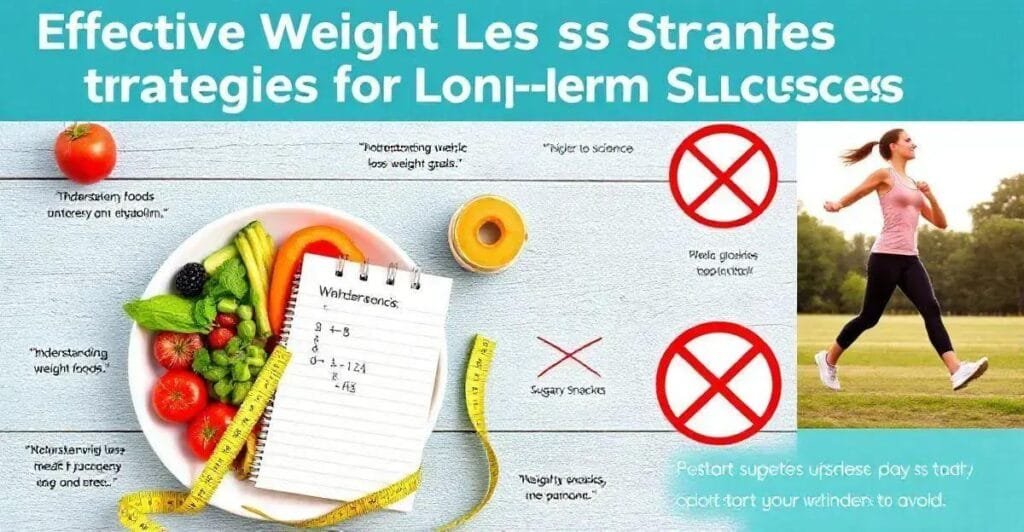Are you tired of feeling stuck in a cycle of weight loss and gain? Do you struggle to find a diet that works for you? You’re not alone. The weight loss industry is saturated with quick fixes and fad diets, but the truth is, sustainable weight loss requires a comprehensive approach.
In this post, we’ll explore the most effective weight loss methods, debunk common myths, and provide actionable tips to help you achieve your weight loss goals. By the end of this article, you’ll have a clear understanding of how to create a personalized weight loss plan that works for you.
The Importance of Setting Realistic Weight Loss Goals
The Importance of Setting Realistic Weight Loss Goals
Setting realistic weight loss goals is crucial to achieving success. Aiming for a specific and achievable goal can help you stay motivated and focused throughout your weight loss journey. Aim to lose 1-2 pounds per week for a sustainable weight loss. Consult with a healthcare professional or a registered dietitian to set a personalized weight loss goal that suits your needs. A realistic goal will also help you avoid frustration and disappointment when faced with setbacks.
Understanding the Science Behind Weight Loss
Weight loss is a complex process that involves various physiological and psychological factors. Understanding the science behind weight loss can help you make informed decisions about your diet and exercise routine. Hormones such as insulin and leptin play a crucial role in regulating appetite and metabolism. Additionally, genetics, sleep patterns, and stress levels can all impact your weight loss journey. By understanding these factors, you can develop a personalized weight loss plan that works for you.
Top Weight Loss Diets Explained
There are countless diet options available, each claiming to be the most effective for weight loss. However, not all diets are created equal. Some diets focus on calorie restriction, while others emphasize macronutrient ratios. Some diets require drastic changes, while others offer more flexible approaches. In this article, we’ll explore the top weight loss diets, including keto, low-carb, and portion control. We’ll also discuss the pros and cons of each diet, helping you make an informed decision about which diet is right for you.
How to Boost Your Metabolism Naturally
Metabolism is the rate at which your body burns calories. Boosting your metabolism naturally can help you lose weight and maintain weight loss over time. Exercise is a crucial factor in boosting metabolism. Incorporate high-intensity interval training (HIIT) into your workout routine to increase your resting metabolic rate. Additionally, incorporate metabolism-boosting foods such as green tea, cayenne pepper, and citrus fruits into your diet. Adequate sleep and stress management are also essential for maintaining a healthy metabolism.
Common Weight Loss Mistakes to Avoid
Making the wrong choices can hinder your weight loss progress. Common mistakes include not setting realistic goals, skipping breakfast, and not incorporating strength training into your workout routine. Additionally, relying on fad diets and not reading food labels can also lead to weight loss plateaus. In this article, we’ll explore common weight loss mistakes and provide actionable tips to help you avoid them.
Maintaining Weight Loss: Tips for Long-Term Success
Weight loss is just the first step in achieving a healthy lifestyle. Maintaining weight loss requires a comprehensive approach that includes a balanced diet, regular exercise, and stress management. Setbacks are inevitable, but they shouldn’t derail your progress. By incorporating these tips into your daily routine, you can maintain weight loss and achieve long-term success. From tracking your progress to staying accountable, we’ll provide expert advice to help you maintain weight loss.
Understanding the Science Behind Weight Loss

The science behind weight loss is complex and multifaceted. It involves a delicate balance of hormones, metabolism, and genetics. Insulin and leptin play a crucial role in regulating appetite and metabolism. Additionally, factors such as sleep patterns, stress levels, and genetics can all impact weight loss. Understanding these factors can help individuals develop a personalized weight loss plan that takes into account their unique physiology. By incorporating the latest research and scientific discoveries, individuals can make informed decisions about their diet and exercise routine.
There are countless diet options available, each claiming to be the most effective for weight loss. However, not all diets are created equal. Some diets focus on calorie restriction, while others emphasize macronutrient ratios. Some diets require drastic changes, while others offer more flexible approaches. In this article, we’ll explore the top weight loss diets, including keto, low-carb, and portion control. We’ll also discuss the pros and cons of each diet, helping you make an informed decision about which diet is right for you.
Metabolism is the rate at which your body burns calories. Boosting your metabolism naturally can help you lose weight and maintain weight loss over time. Exercise is a crucial factor in boosting metabolism. Incorporate high-intensity interval training (HIIT) into your workout routine to increase your resting metabolic rate. Additionally, incorporate metabolism-boosting foods such as green tea, cayenne pepper, and citrus fruits into your diet. Adequate sleep and stress management are also essential for maintaining a healthy metabolism.
Making the wrong choices can hinder your weight loss progress. Common mistakes include not setting realistic goals, skipping breakfast, and not incorporating strength training into your workout routine. Additionally, relying on fad diets and not reading food labels can also lead to weight loss plateaus. In this article, we’ll explore common weight loss mistakes and provide actionable tips to help you avoid them.
Weight loss is just the first step in achieving a healthy lifestyle. Maintaining weight loss requires a comprehensive approach that includes a balanced diet, regular exercise, and stress management. Setbacks are inevitable, but they shouldn’t derail your progress. By incorporating these tips into your daily routine, you can maintain weight loss and achieve long-term success. From tracking your progress to staying accountable, we’ll provide expert advice to help you maintain weight loss.
Setting realistic weight loss goals is crucial to achieving success. Aiming for a specific and achievable goal can help you stay motivated and focused throughout your weight loss journey. Aim to lose 1-2 pounds per week for a sustainable weight loss. Consult with a healthcare professional or a registered dietitian to set a personalized weight loss goal that suits your needs. A realistic goal will also help you avoid frustration and disappointment when faced with setbacks.
Top Weight Loss Diets Explained
The weight loss industry is flooded with various diet options, each claiming to be the most effective. However, not all diets are created equal.
Some diets focus on calorie restriction, while others emphasize macronutrient ratios. Some diets require drastic changes, while others offer more flexible approaches.
In this article, we’ll delve into the top weight loss diets, examining the pros and cons of each. We’ll look at the science behind each diet, exploring how they work and what makes them effective.
By the end of this article, you’ll have a comprehensive understanding of the top weight loss diets and be equipped to make an informed decision about which diet is right for you.
How to Boost Your Metabolism Naturally

Metabolism is the key to unlocking weight loss and maintaining overall health. A slow metabolism can hinder weight loss efforts, while a fast metabolism can help you shed pounds quickly.
Fortunately, there are several natural ways to boost your metabolism. Exercise is a crucial factor in boosting metabolism, with high-intensity interval training (HIIT) being particularly effective.
Additionally, incorporating metabolism-boosting foods such as green tea, cayenne pepper, and citrus fruits into your diet can help increase your metabolic rate.
Adequate sleep and stress management are also essential for maintaining a healthy metabolism.
By incorporating these natural methods into your daily routine, you can boost your metabolism and achieve weight loss success.
Common Weight Loss Mistakes to Avoid
Losing weight can be a challenging and frustrating process, especially when you’re not seeing the results you want.
Unfortunately, making common mistakes can hinder your progress and lead to disappointment.
Some common mistakes include not setting realistic goals, skipping breakfast, and not incorporating strength training into your workout routine.
Additionally, relying on fad diets and not reading food labels can also lead to weight loss plateaus.
In this article, we’ll explore common weight loss mistakes and provide actionable tips to help you avoid them, ensuring you achieve long-term success.
Maintaining Weight Loss: Tips for Long-Term Success

Maintaining weight loss is just as important as achieving it. Unfortunately, many people struggle to keep the weight off after reaching their goal. To maintain weight loss, it’s essential to focus on long-term habits rather than quick fixes.
This includes developing a balanced diet, incorporating regular exercise into your routine, and managing stress levels.
Additionally, tracking your progress and staying accountable can help you stay on track. By following these tips, you can maintain your weight loss and achieve long-term success.
FAQ – Frequently Asked Questions about Weight Loss
What are the most effective weight loss diets?
The most effective weight loss diets are those that are tailored to your individual needs and goals. A balanced diet that includes plenty of fruits, vegetables, whole grains, and lean protein sources is a great starting point. Additionally, incorporating regular exercise and stress management techniques can help you achieve weight loss success.
How can I boost my metabolism naturally?
Boosting your metabolism naturally can be achieved through a combination of diet, exercise, and lifestyle changes. Incorporating foods that are high in fiber, protein, and healthy fats, such as lean meats, whole grains, and avocados, can help increase your metabolism. Additionally, regular exercise, such as high-intensity interval training, and stress management techniques can also help boost your metabolism.
What are the most common weight loss mistakes to avoid?
The most common weight loss mistakes to avoid include not setting realistic goals, skipping breakfast, and not incorporating strength training into your workout routine. Additionally, relying on fad diets and not reading food labels can also lead to weight loss plateaus. By avoiding these common mistakes, you can set yourself up for weight loss success.
How can I maintain weight loss over time?
Maintaining weight loss over time requires a long-term commitment to healthy habits. This includes developing a balanced diet, incorporating regular exercise, and managing stress levels. Additionally, tracking your progress and staying accountable can also help you stay on track and maintain weight loss over time.
What are some tips for staying motivated during weight loss?
Staying motivated during weight loss can be challenging, but there are several strategies that can help. Setting realistic goals, tracking your progress, and celebrating small victories can help keep you motivated and focused on your weight loss goals.
What are some common myths about weight loss?
There are several common myths about weight loss that can be misleading or inaccurate. For example, some people believe that you need to cut out entire food groups or that you need to starve yourself to lose weight. However, these approaches are not only ineffective but also potentially harmful. Instead, focus on developing a balanced diet and incorporating regular exercise to achieve weight loss success.


